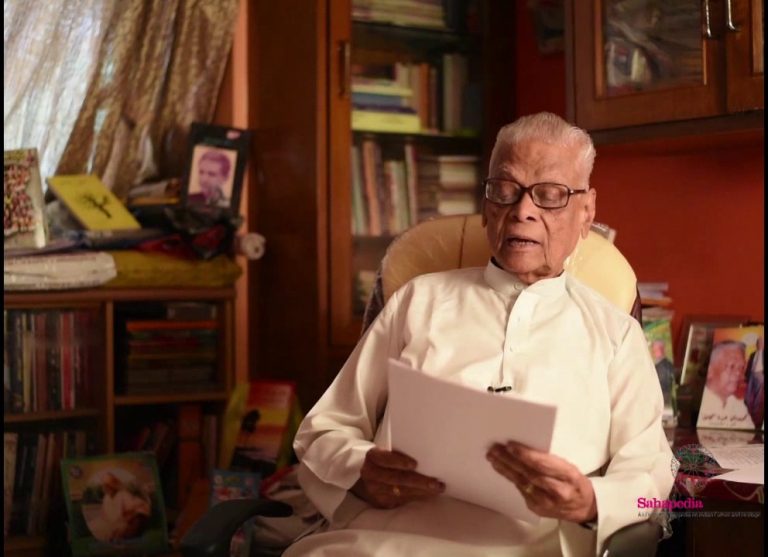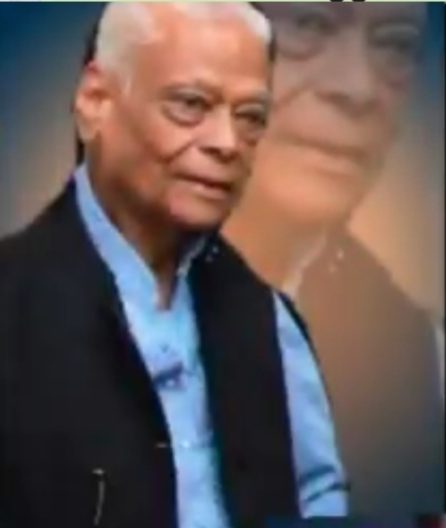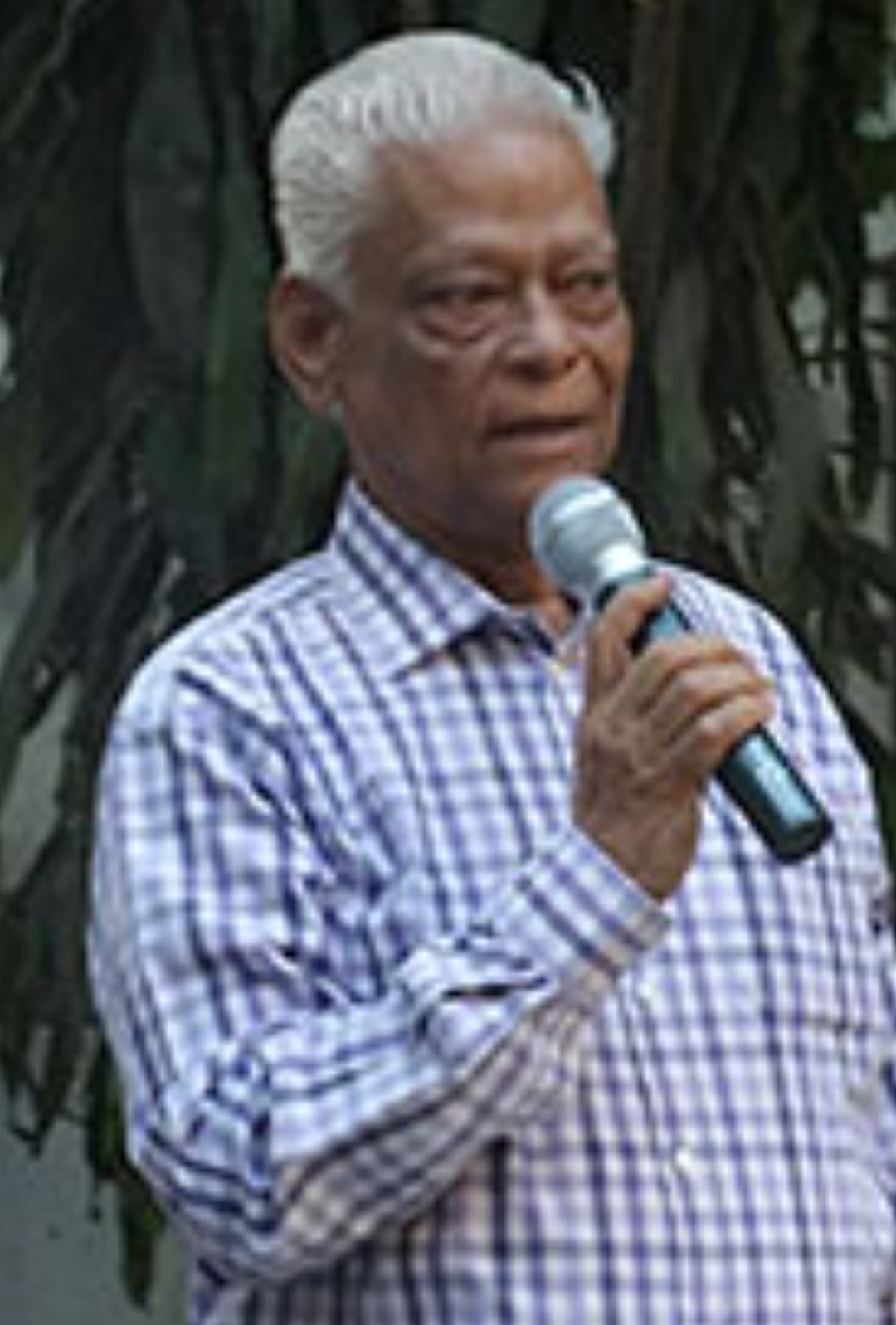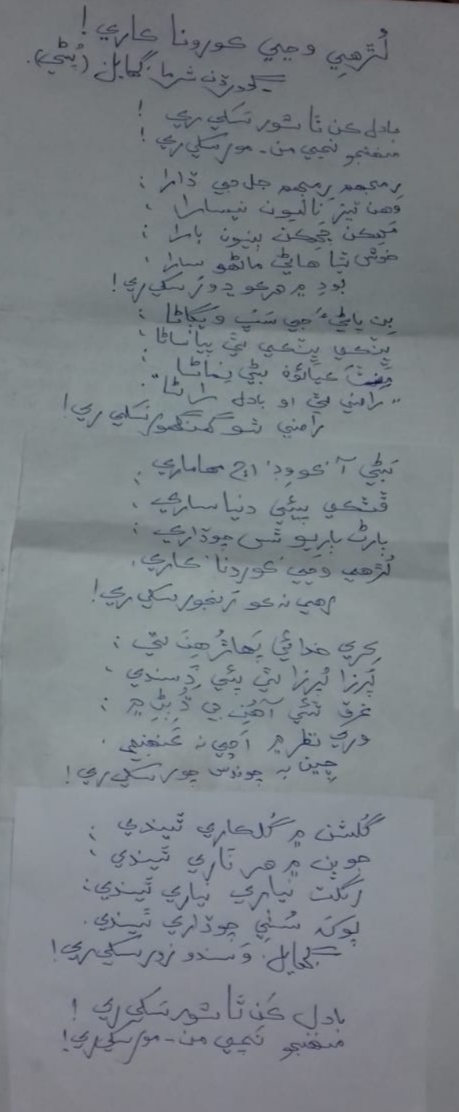
Sindhi schools and colleges are closed. The atmosphere is not favorable, as even the newspapers and magazine have gone online and finding the buyers and readers is like milking a bull, but I am not disappointed – Goverdhan Sharma
The acclaimed poet, writer and educationist, born in Mehar Town of Sindh in 1937, also shares agonies of partition in an interview to Sindh Courier
By Nasir Aijaz
Shri Goverdhan Sharma ‘Ghayal’, a multifaceted personality, acclaimed Sindhi-Hindi poet, writer, educationist, social worker and journalist, is very much hopeful of future of Sindhi language and firmly believes in its existence in India at least for next two centuries.
“Although Sindhi medium schools and colleges in India are closed and there are very few schools and colleges where Sindhi is being taught as a subject, but still we have not lost the hope. Yes, the atmosphere is not favorable, as even the newspapers and magazine have gone online and finding the buyers and readers is like milking a bull, but I am not disappointed,” the octogenarian writer viewed in an interview to Sindh Courier.
“The Cheti Chand Movement launched by Prof. Ram Panjwani, holding of Sindhi musical concerts in India and abroad by Gobind Malhi, and the tireless efforts made by Dada Jashan Vaswani, Swami Leela Shah, Saeen Chanduram, Sachu Satram, Sadhram and others for promoting Sindhi language and culture would definitely leave impact,” he said and confidently opined, “I am of firm belief that Sindh language is going to exist in India at least for next two centuries.”
Born in Mehar town of Sindh on December 1, 1937, to Mahaaraaj Namdev Gokuldas, a renowned music master of that time, Shri Goverdhan also shared his memoirs of pre-partition days.
“Before partition, peace and tranquility prevailed and Hindu and Muslims lived like brothers sharing their joys sorrows and helping each other at difficult times in Mehar like that of entire Sindh. During religious festivities like Eid, Diyari (Dewali), and Holi, they used to greet each other and share the sweet dishes.”
“I still remember a Muslim woman Salma who used to come to our home to help my mother in household work and her daughter Zeenat, three years younger than me, would often come and sleep in the same large size Peengho (Traditional Sindhi Swing) after having lunch. Her mother would pull the Jhali (a big fan made of wood and cloth hung in the ceiling) during the scorching summer.”
On a question about the partition memoirs, Shri Goverdhan said, “I have very painful memoirs of the situation that prevailed at the time of partition in 1947. It would require a complete book to pen down those memoirs however I would like to share some of them concerning our displacement from motherland.”
“Leaving our ancestral abode in Mehar town of Sindh, we boarded a train to first reach at Hyderabad. My mother had cooked some sweet and salty loaves and cookies (traditional breads of different tastes) like Satpurra, Nankhatai and such other things to meet the food needs of at least four to five days, as nobody knew the situation we might face in coming days. All these things were packed in a big tin box. However at Dadu railway station we found the tin box full of stones. Somebody had taken away whatever it contained. We felt very disturbed but my mother thanked the God saying, “The loaves would at least help someone to pacify his hunger.”
“We had to stay in Hyderabad a few days before leaving for Karachi. We got some place in Pucca Qila (Fort) to stay but one day we were attacked by a group of Indian refugees and again we and other fifty to sixty families had to leave that place in such a hurry that finding no time to take meals, my father rushed out of the fort with his family members taking the half-cooked food from the Sigri (Fireplace) to save the lives,” Shri Goverdhan Sharma told.
“Our family had to stay in Karachi in a tent-village for our turn to board a ship for onward journey to Bombay, as a large number of people were already awaiting there.”
“Leaving aside the hardships we faced in getting food, the more humiliating situation, which I still remember, was that we had to share the makeshift toilets at the morning time as there used to be long queues of people for defecating. To cope with the situation, it was decided that two persons would share the toilet at a time sitting in a position that their faces would remain in opposite direction. Thank god there were separate toilets for the females.”
About his life in India, he said, “Our family landed at Bombay port in 1948 where we were provided with Khichni (Farrago) placed on banana leaf. This way, a well off family of Sindh, had to start an agonizing life as refugee. Our life as refugee continued for about six to seven years during which we were made to live first at Sagar Camp, then at Kalyan Camp from where we had to shift to Madh Camp, Akbar Camp and finally we were placed at Kolhapur Camp of Gandhi Nagar.”
“Our journey as refugee however didn’t end here. We shifted to Moolchand Siva Ashram where our 5-member family – father, mother and three children, had to live in a single-room barrack with no facility of water and toilet. The only thing provided to us was a 40 volt bulb.”
It was an arduous period of life to survive and settle somewhere.
“I received education in Gujarat, Madhya Pradesh and Maharashtra and did B.A. and Masters in Sindhi with first position from University of Pune. I had joined the service as Hindi teacher in 1955 at Adipur and after that served at Gandhidham, Gopalpure, Kandla Port, Baroda and Pune. In 1973, after having done masters, I was appointed as lecturer and served at various colleges, where I taught Sindhi language, and finally was posted in Dubai. I served as trained post-graduate teacher and taught Sindhi for half a century and retired as Head, Department of Hindi at Indian High School Dubai in December 2000, where I was posted since 1983.”
“I had also been the member of Board of Studies for Sindhi at University of Pune for six years,” he shared and added, “I am nominated member on Editorial Board for Sindhi textbooks for students of class one to 12 at Maharashtra State Textbook Bureau since 2013.”
“The Bureau has published Sindhi textbooks for the students, which are being taught in some states,” he told.
 Sharing his literary contribution, Shri Goverdhan Sharma said, “The sacred water of Sindhu still flows in my blood veins. I have devoted all my life to promoting the Sindhi language, education, culture and art. I have authored a dozen books in Sindhi of which one is being taught to students of B. A. at Mumbai University at textbook. Three other books in Hindi have also been published.”
Sharing his literary contribution, Shri Goverdhan Sharma said, “The sacred water of Sindhu still flows in my blood veins. I have devoted all my life to promoting the Sindhi language, education, culture and art. I have authored a dozen books in Sindhi of which one is being taught to students of B. A. at Mumbai University at textbook. Three other books in Hindi have also been published.”
Some of his published books are: ‘Uhe Maaur Bhali Murkan’ (Let Those Mothers Smile), Sindhi Poetry, 1964; ‘Koonjun Thyun Kunikan’ (Sound of Birds), Sindhi Poetry, 1967; ‘Kalam Jo Sipahi’ (Soldier of Pen), Sindhi Poetry, 1973; ‘Meree Chundee (Small Savings), Sindhi Poetry, 1998; ‘Tukda Tukda Ninda (Bits & Pieces), Sindhi Poetry, 2001. The books also include his travelogue of Sindh titled as ‘Ain Maan Sindh Pahuchee Viyusi’ (At last I arrived in Sindh) published in 2010.
As dramatist also, Goverdhan Sharma wrote, staged, acted and directed several one act plays. A few significant are ‘Maa Bulati Hai’ (Mother is calling), translation of late Harikant’s play Aakhir Jeet Asanji; ‘Makan Khali Ahe’ (The House is Vacant) and ‘Umar Maruee’, folk tale of Sindh.
Moreover, he Jointly edited three books ‘Bewas Hik Abhyas’ (1972), ‘Bodh Shanas’ (1978) and ‘Bewas-Darshan’ (1980), and edited five magazines including ‘Maitri’ in Adipur in 1962, ‘’Pushpa’ and ‘Sabhayata’ in 1969, ‘Gyandeep’ at Pune in 1970 and ‘The Indian’ at Dubai from 1994 to 2000.
Shri Goverdhan had also been a freelance journalist for several Sindhi, Hindi and English newspapers and magazines. He organized and participated in a number of national Sindhi seminars, mushairas and music concerts.
 Shri Goverdhan, who received recognition and was honored with over a dozen literary awards and of best teacher told that he was also affiliated to Sindhi Sahitya Sangat of Pune as General Secretary from 1970 to 1983. “After retirement, I founded Sindhi Adabi Sabha in Pune in the year 2001 and served as its founder president. Currently, five female writers are running this organization.”
Shri Goverdhan, who received recognition and was honored with over a dozen literary awards and of best teacher told that he was also affiliated to Sindhi Sahitya Sangat of Pune as General Secretary from 1970 to 1983. “After retirement, I founded Sindhi Adabi Sabha in Pune in the year 2001 and served as its founder president. Currently, five female writers are running this organization.”
“I developed love for poetry and music because of my father, who was music master and had command on harmonium, dholak, saarangee and Surando. He had played Tablo even with Bhagat Kanwar Ram, while in Mehar town, he actively participated in music events of Saeen Atmaram Sahib taking place at Mehar Darbar located in front of our home. He continued this practice even after partition in India.”
“And all this left deep influence on me, because often I used to wake up all the night on such occasions,” he told.
Shri Goverdhan visited Sindh once in 2010. He said, “Accompanied by my wife Shrimati Rajni, I visited Sindh to see my motherland. We were warmly received at Karachi airport by poets Abdul Ghaffar Tabbasum and Rakhyal Morai, Nagpal, a relative in Karachi, and Mahesh Hablani, who had medicine business in Karachi. “I met a number of notables there including Meehonmal Engineer.”

“We also visited Sachu Satram Dham of Raharki, Jarwar, Pano Aqil, Daharki, Shiv Temple of Raharki, shrine of Qalandar Lal Shahbaz in Sehwan. We also drove to Mehar town to see my ancestral home. At Mehar I met with Dr. Mukesh and Azad Anwar Kandhro in Mehar, Abdullah Jesar advocate of Moro, and Saeen Ibrahim Joyo, Waliram Valabh and Taj Joyo and others in Hyderabad.”
Watch video: Listen to Shri Goverdhan Sharma reciting Sur Samundi of Shah Abdul Latif Bhittai
“On the way we were warmly received at Shikarpur, Sukkur, Larkana, Sindhi Language Authority office in Hyderabad and Institute of Sindhology Jamshoro and had an opportunity to see the Sindhu River.”
“At the end of visit, my new book, the collection of my poetry, was launched at an auditorium in Karachi.”
“I had married in Ajmer, Rajasthan but I am settled in Pune since long along with my three children, though, our ancestral home exists in Adipur, Kutch where my younger brother and five sisters use to live along with their families,” he told.
____________________